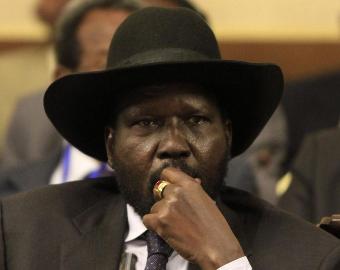South Sudan denies it is obstructing peace process
April 4, 2014 (JUBA) – The South Sudanese government has denied that it is behaving in a way that is obstructive to peace process, stressing it was the first party to accept peaceful dialogue to end the conflict without conditions.

South Sudan’s deputy foreign affairs minister, Peter Bashir Gbandi, said on Friday that the government remains committed to finding a solution to the conflict, expressing hopes that the decision by the US would not have any negative impact on the negotiations.
A ceasefire deal signed on 23 January failed to stem the violence, with both sides violating the terms of the agreement. The United Nations estimates that over one million people have been displaced in the conflict, which erupted in mid-December last year when political tensions in the country’s ruling party (SPLM) came to a head.
“The first party to come out and declare a clear position about how best this conflict can be arrested was the government. The government came out immediately to support the regional initiative to resolve differences through peaceful dialogue. The leadership accepted in principle to negotiate a peaceful resolution of the conflict without placing any condition. This is clear proof that the government had never wanted to be obstructive to [a] peaceful settlement,” Gbandi told Sudan Tribune on Friday.
Cabinet affairs minister Martin Elia Lomuro said South Sudan is a sovereign state and that its leadership should not be pressured to accept any deal that is against the will of the public.
South Sudanese are deeply divided over the conflict with some taking the side of the government while others back the rebels, led by former vice-president Riek Machar, which consists of defectors from the army and disaffected members of South Sudan’s ruling party.
“What our people want is that the country and its leadership should be respected, especially by our friends and other countries. It is our conviction that peace, tolerance, respect and negotiations are values that must be remembered and cultivated for South Sudan to fit into the world stage,” Lomuro told reporters on Friday.
The speaker of South Sudan’s national legislative assembly, Magok Rundial, stressed that the resolution of differences should come from the people of South Sudan first, rather than the importation of imposed solutions.
“The contradictions or any misunderstanding everywhere is solved by the parties to the conflict. Our people should therefore not accept to import [a] solution,” Rundial said, adding that the conflict must be resolved without further violence.
“Is the open road of the vote in the constitutional faithful compliance, which should replace the stone in our eyes and hearts as a political alternative?” he said.
“Those who want power should accept peace without giving any conditions and causing the loss of the lives of our people so that they get the opportunity to take part in the next general elections,” Rundial added.
The latest conflict is the worst the country has witnessed since seceding from Sudan in July 2011 after a more than two decades of civil war.
(ST)
